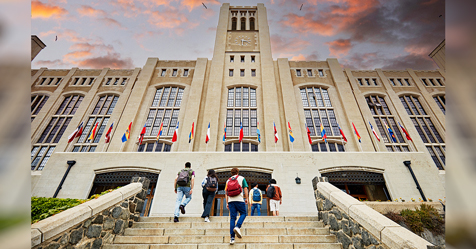Australia Leads UN in First Pledge for Indoor Air Quality
The Australian Academy of Science and Burnet Institute are leading global efforts at the United Nations (U.N.) to declare healthy indoor air a human right.
On Sept. 24, more than 300 leaders came together at the 80th U.N. General Assembly. The event is being co-sponsored by France and Montenegro, while Brown University’s School of Public Health and the OSLUV Project are joint co-convenors alongside the Academy and Burnet Institute.
The global pledge, already signed by over 150 organizations, is the first international effort to recognize clean indoor air as essential to health and well-being. This effort builds on the Academy’s sustained advocacy to reduce the negative impacts of airborne transmission of viruses and pollutants in indoor spaces.
Most recently, the Academy’s submission to the Productivity Commission’s review recommends establishing indoor air quality standards, underpinned by guidelines aligned with World Health Organization recommendations.
These measures can improve overall health, reduce absenteeism, and improve performance in childcare settings, schools, hospitals, aged care settings, and all workplaces.
Relatedly, join the experts at the ISSA Cleaning & Hygiene Expo 2025 in Sydney from 1 to 3:30 p.m. on Oct. 30 for an in-depth workshop on navigating new standards for safer buildings. Click here to learn more and register.
San Diego Approves $25 Minimum Wage for Hospitality Workers
Higher wages in San Diego still don’t match the cost of living in the city
The San Diego City Council on Sept. 16 agreed to raise the minimum wage for only some hospitality workers to US$25 an hour, phased in over several years.
The ordinance dictates that the city’s current minimum wage of $17.25 will increase beginning July 1, 2026, at various rates depending on the place of employment. The San Diego News reported that the increase will only apply to city workers at amusement parks, event centers, and hotels with at least 150 guest rooms.
But not every entity would have to pay higher wages, according to San Diego News. San Diego State University, owned by the state of California, would find itself exempt for Viejas Arena and the Cal Coast Credit Union Amphitheatre. The San Diego Zoo is also exempt from the measure, while SeaWorld San Diego is not.
Higher wages are divided between workers at event centers—scheduled at $21.06 in 2026, $22 in 2027, $23 in 2028, $24 in 2029, and $25 in 2030—and those in hotels and amusement parks—laid out as $19 in 2026, $20.50 in 2027, $22 in 2028, $23.50 in 2029, and $25 in 2030.
Since the council adopted the Earned Sick Leave and Minimum Wage Ordinance in 2016, the minimum wage within the city’s boundaries has increased from $10.50 to $17.25—higher than California’s $16.50 hourly rate and far higher than the nation’s $7.25 minimum.
However, the cost of living in San Diego has increased independently of the minimum wage. According to the Massachusetts Institute of Technology’s Living Wage Calculator, a single person would need to earn $30.71 per hour in San Diego County to support themselves while working full-time. A two-adult and one-child household would need to earn $49.13 per hour by the same calculator.
San Diego’s legislation comes less than a week later than the state of Maine increasing its minimum wage from $14.65 to $15.10 starting Jan. 1, 2026. This is a slightly smaller jump than the 50 cent increase the state saw between 2024 and 2025.
Per Maine law and a 2016 citizens referendum, the state is required to make an annual adjustment based on the cost-of-living index for the Northeast Region. Based on data from the U.S. Department of Labor, a 3.1% increase in the cost-of-living index occurred between August 2024 and the same month a year prior.
Relatedly, New York State’s labor board will have wider powers to intervene in labor disputes thanks to a new bill signed into law by Gov. Kathy Hochul this month. According to Hochul, this legislation comes in response to President Donald Trump interfering with the National Labor Relations Board’s (NLRB) ability to make and enforce labor decisions. The NLRB is responsible for certifying union elections, hearing and deciding unfair labor practice cases, conducting labor violation investigations, and facilitating settlements in labor disputes. The new state law would allow the Public Employment Relations Board (PERB) to serve similar functions while the NLRB is unable to act, as has been the case for most of 2025.


